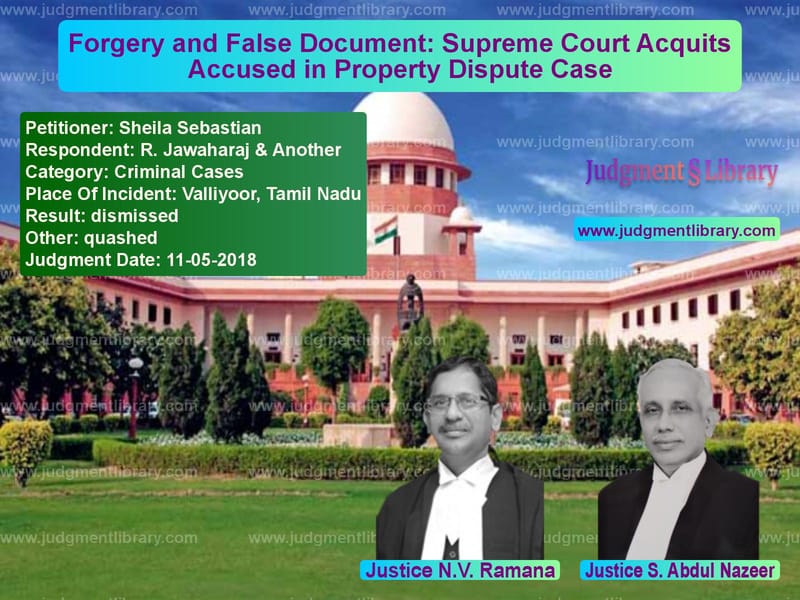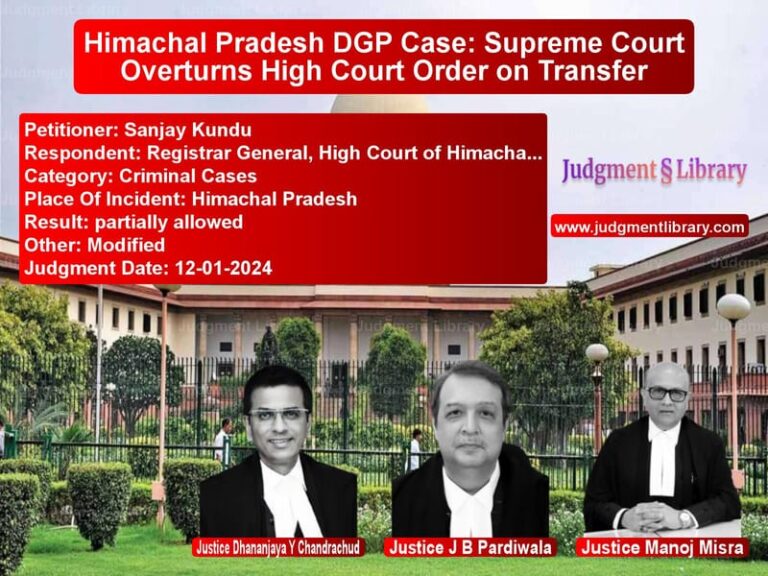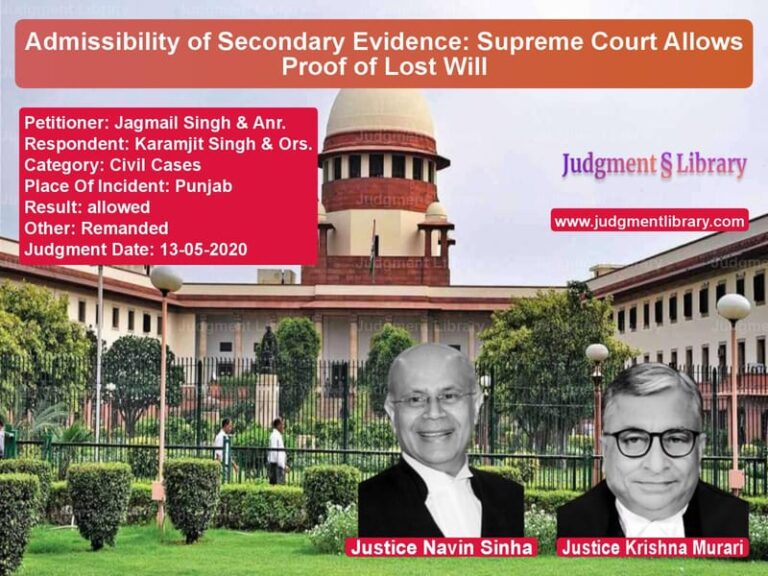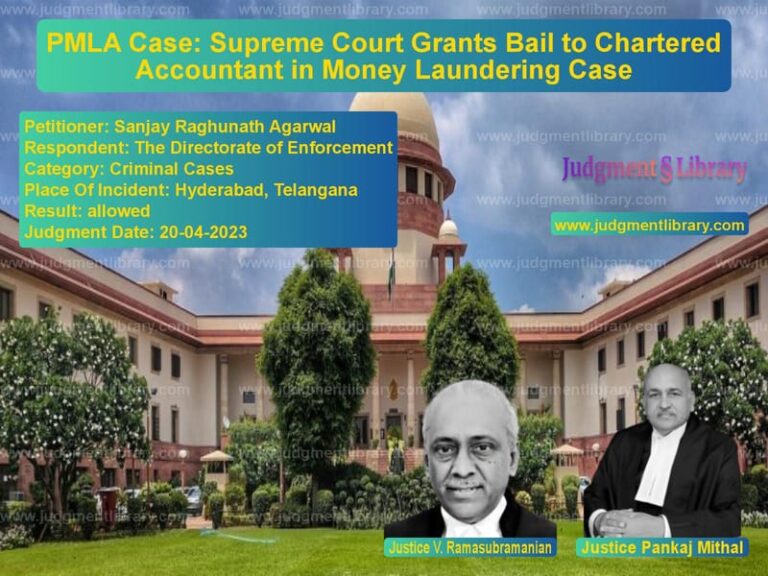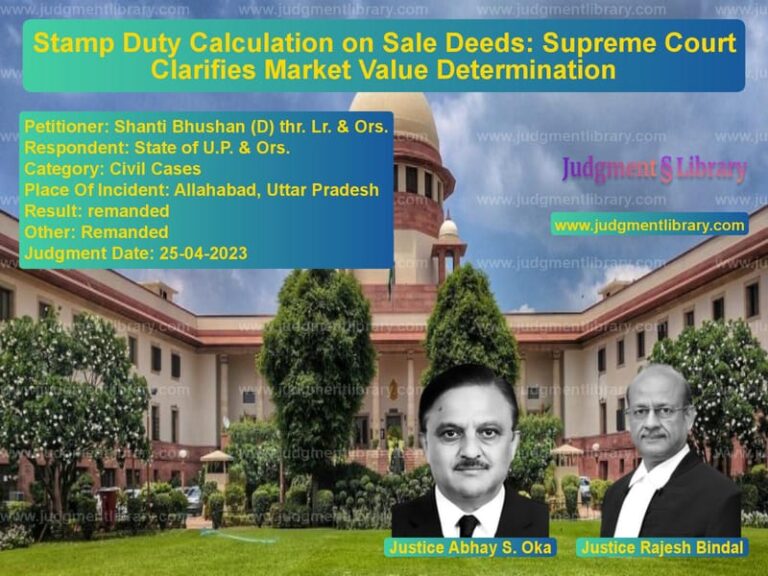Forgery and False Document: Supreme Court Acquits Accused in Property Dispute Case
The case of Sheila Sebastian vs. R. Jawaharaj & Another revolves around allegations of forgery and fraudulent property transactions. The Supreme Court was called upon to decide whether the accused individuals could be held guilty of forgery under Section 465 of the Indian Penal Code (IPC) without having personally created the false document.
Background of the Case
The dispute originated when the complainant, Mrs. Doris Victor (now deceased), owned a plot of land in Valliyoor village. She alleged that R. Jawaharaj, the first accused, fraudulently obtained a Power of Attorney (PoA) in his name by impersonating her.
According to the complaint:
- Accused No.1 (R. Jawaharaj) allegedly forged a Power of Attorney with the help of an imposter.
- Using this PoA, he executed a mortgage deed in favor of Accused No.2 (Rajapandi) for Rs. 50,000.
- Upon discovering this, Mrs. Doris Victor filed a police complaint, leading to an FIR on March 14, 1998.
- After her demise, her daughter, Sheila Sebastian, pursued the case.
Trial Court and High Court Decisions
The Judicial Magistrate convicted:
- Accused No.1 under Section 465 IPC (forgery) with a 2-year simple imprisonment term and a fine of Rs. 5,000.
- Accused No.2 under Section 465 read with 109 IPC (abetment) with 1-year imprisonment and a fine of Rs. 2,000.
The accused appealed before the Sessions Court, which upheld their conviction.
However, the Madras High Court (Madurai Bench) set aside the conviction, ruling that the offense of forgery under Section 465 IPC was not applicable in the case.
Arguments by the Appellant (Sheila Sebastian)
The appellant contended that:
- The accused fraudulently created the Power of Attorney and used it to execute an illegal transaction.
- The High Court wrongly interpreted Section 464 IPC (making of a false document).
- The accused intentionally fabricated a document to deceive and claim ownership of the complainant’s land.
Arguments by the Respondents (Accused)
The defense maintained that:
- The accused were not the ones who physically created the false document.
- Forgery, as defined in Section 463 IPC, requires the person to have actually “made” a false document.
- The mortgage deed had already been canceled by a competent civil court.
- The complainant had already recovered her property.
Supreme Court’s Observations
The Supreme Court, comprising Justice N.V. Ramana and Justice S. Abdul Nazeer, examined the essential ingredients of forgery and the making of false documents.
1. Definition of Forgery and False Documents
The Court examined the legal definitions:
- Section 463 IPC (Forgery): Making a false document with intent to cause damage or commit fraud.
- Section 464 IPC (Making a False Document): The accused must have personally “made” the false document.
The Court ruled:
“A person cannot be held liable for forgery unless they themselves made the false document or caused someone to create it on their behalf.”
2. Absence of Evidence Against Accused
The Court found no direct evidence that:
- The accused created the false Power of Attorney.
- Their signatures were present on the forged document.
- The accused orchestrated the forgery beyond simply benefiting from it.
3. Previous Rulings on Forgery
The Court referred to earlier precedents:
- Md. Ibrahim vs. State of Bihar (2009): Holding that forgery requires a person to have personally executed or altered the document.
- Mir Nagvi Askari vs. CBI (2009): Stating that making a false claim does not amount to forgery unless a document is directly falsified.
Final Judgment
The Supreme Court ruled:
- The accused were not guilty under Section 465 IPC.
- The conviction was set aside as the prosecution failed to prove forgery.
- The appeal was dismissed, upholding the High Court’s ruling.
The Court concluded:
“For forgery to be established, a person must have personally made or executed the false document. Mere benefit from a forged document does not constitute forgery.”
Impact of the Judgment
This ruling establishes critical legal principles:
- Clarifies the elements of forgery: Simply using a forged document does not make someone guilty of forgery.
- Prevents misuse of forgery charges: Ensures that only those who actively create false documents are held accountable.
- Upholds due process: The decision prevents wrongful convictions based on circumstantial benefit rather than direct involvement.
This ruling strengthens the interpretation of Sections 463, 464, and 465 IPC, ensuring that forgery laws are applied justly.
Petitioner Name: Sheila Sebastian.Respondent Name: R. Jawaharaj & Another.Judgment By: Justice N.V. Ramana, Justice S. Abdul Nazeer.Place Of Incident: Valliyoor, Tamil Nadu.Judgment Date: 11-05-2018.
Don’t miss out on the full details! Download the complete judgment in PDF format below and gain valuable insights instantly!
Download Judgment: Sheila Sebastian vs R. Jawaharaj & Anoth Supreme Court of India Judgment Dated 11-05-2018.pdf
Direct Downlaod Judgment: Direct downlaod this Judgment
See all petitions in Fraud and Forgery
See all petitions in Property Disputes
See all petitions in Legal Malpractice
See all petitions in Judgment by N.V. Ramana
See all petitions in Judgment by S. Abdul Nazeer
See all petitions in dismissed
See all petitions in Quashed
See all petitions in supreme court of India judgments May 2018
See all petitions in 2018 judgments
See all posts in Criminal Cases Category
See all allowed petitions in Criminal Cases Category
See all Dismissed petitions in Criminal Cases Category
See all partially allowed petitions in Criminal Cases Category

